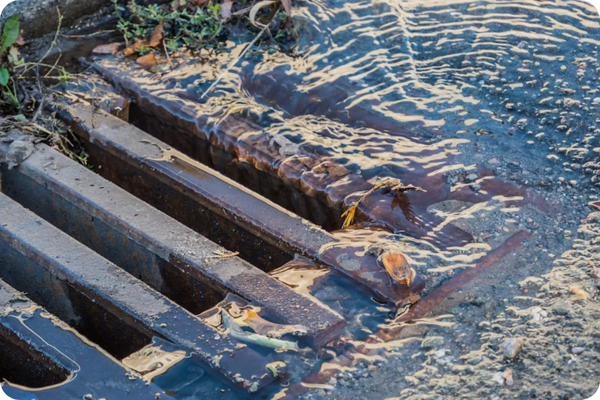Stormwater regulations across the Mid-Atlantic continue to tighten – and for good reason. As development increases and rainfall patterns shift, effective stormwater management is essential for protecting local waterways, reducing flood risks, and maintaining compliance.
At the center of these efforts are Best Management Practices (BMPs): the tools, strategies, and systems used to control runoff, improve water quality, and meet state and local requirements. But not all BMPs work the same way.
Understanding the difference between structural and non-structural BMPs is foundational for anyone responsible for commercial, industrial, or multi-family properties. Here’s a practical, “back-to-basics” comparison – and what each type means for ongoing maintenance, budgeting, and compliance across Maryland, DC, Northern Virginia, and Delaware.

What Are Structural Stormwater BMPs?
Structural BMPs are physical, built systems designed to control, capture, filter, or treat stormwater. They are engineered solutions that require design, construction, and ongoing maintenance to function properly.
Common Structural BMPs
These include:
- Retention (Wet) Ponds
Designed to hold a permanent pool of water while treating runoff through settling and biological processes. - Detention (Dry) Ponds
Temporarily store runoff during storms and release it slowly to reduce peak flows. - Bioswales & Bioretention Facilities (Rain Gardens)
Use engineered soil and vegetation to filter runoff and remove pollutants. - Underground Stormwater Vaults
Store or treat runoff in areas with limited space – common in urban and commercial sites. - Contech StormFilter® Systems & Other Proprietary Devices
Cartridge-based systems that remove sediment, oils, nutrients, and other pollutants. - Sand Filters & Media Filters
Treat runoff through layered filtration beds.
Structural BMP Benefits
- Highly effective at pollutant removal
- Address volume control, water quality, and peak flow reduction
- Required for many development and redevelopment projects
- Can handle large drainage areas
Structural BMP Challenges
- Require routine inspection and maintenance
- Can accumulate sediment, debris, and invasive vegetation
- May need periodic rehabilitation (e.g., regrading, replanting, cartridge replacement, dredging)
- Higher upfront cost compared to non-structural strategies
For property managers, structural BMPs are an investment – but one that only performs if properly maintained.
What Are Non-Structural Stormwater BMPs?
Non-structural BMPs are operational, procedural, or design-based strategies that reduce stormwater impacts without requiring built infrastructure.
These BMPs focus on prevention, minimizing pollution and reducing runoff at the source.
Common Non-Structural BMPs
Examples include:
- Good housekeeping practices (spill prevention, routine sweeping, proper waste handling)
- Pollution prevention plans (P2 Plans)
- Landscaping choices that reduce runoff (native plants, reduced impervious areas)
- Public education and signage
- Illicit discharge detection and elimination (IDDE) programs
- Nutrient-smart landscaping and fertilizer reduction
- Rainwater harvesting policies
- Maintenance programs that reduce pollutant buildup
(like regular storm drain cleaning or parking lot sweeping)
Non-Structural BMP Benefits
- Cost-effective
- Support long-term compliance
- Improve overall site cleanliness and safety
- Reduce the load placed on structural BMPs
Non-Structural BMP Challenges
- Require staff training and consistent implementation
- Results may be less visible to property managers
- Must be routinely documented for regulatory compliance
- Typically work best when paired with structural systems
Why You Need Both: The Best Approach for Compliance
Most commercial and multifamily properties in the Chesapeake Bay watershed – including Maryland, DC, Northern Virginia, and Delaware – rely on a combination of both BMP types.
Structural BMPs
Manage the physical runoff, control peak flows, and remove pollutants.
Non-Structural BMPs
Reduce pollution before it enters the stormwater system and support regulatory documentation.
Together, they create a complete stormwater compliance strategy that:
- Protects local waterways
- Reduces maintenance emergencies
- Improves long-term site performance
- Helps avoid violations and fines
- Supports MS4 and Chesapeake Bay TMDL requirements
What This Means for Property Managers and Owners
If you’re responsible for stormwater compliance, here’s what matters most:
1. Know what BMPs your property has
Many facilities have multiple BMP types – and some property managers inherit systems without complete documentation.
2. Maintain structural BMPs consistently
Retention ponds, bioretention areas, storm filters, and vaults must be inspected and serviced regularly to remain compliant.
3. Document non-structural BMP programs
Regulators require records demonstrating pollution-prevention practices.
4. Conduct routine inspections
Professional oversight helps catch issues early – before they become expensive or lead to violations.
5. Plan for long-term budgets
Structural BMPs may need periodic restoration (replanting, sediment removal, repairs).
iSTORMWATER: Your Partner for Complete Stormwater BMP Support
Our team works with commercial property managers, government contractors, and developers across MD, DC, Northern Virginia, and DE to keep facilities compliant and performing.
We offer:
- Structural BMP inspections, maintenance, installation & repairs
- Vault and StormFilter® cartridge cleaning
- Pond maintenance and dredging
- Bioretention restoration and vegetation management
- Non-structural BMP program support
- Stormwater compliance documentation
- Emergency service and corrective action plans
If you’re unsure what BMPs your site has – or whether they’re functioning properly – we can help.
📞 Call us at (410) 231-3455 or 💬 Contact us online.
Real Results
iStormwater LLC was an excellent choice. They made the process of the Stormwater pond repairs seamless. They took charge of the project and got the project approved and passing the inspection. We highly recommend them and would use them again.
Incredible stormwater management service. The owner John consulted on a property I manage and ended up saving us thousands of dollars in environmental fees from the government. Now, our property is compliant with the EPA and we have a great partner to keep us maintained on stormwater regulations over time.
So helpful with all of my water issues.
Great communication and leadership and a family friendly atmosphere. Thank you John!
Stormwater regulations across the Mid-Atlantic continue to tighten - and for good reason. As development increases and rainfall patterns shift, effective stormwater management is essential...
- Annapolis
- Anne Arundel County
- Baltimore County
- Baltimore
- Bel Air South
- Bethesda
- Bowie
- Cecil County
- Charles County
- Columbia
- Gaithersburg
- Glen Burnie
- Howard County
- Montgomery County
- Pasadena
- Prince George’s County
- Rockville
- Severna Park
- St. Mary’s County



